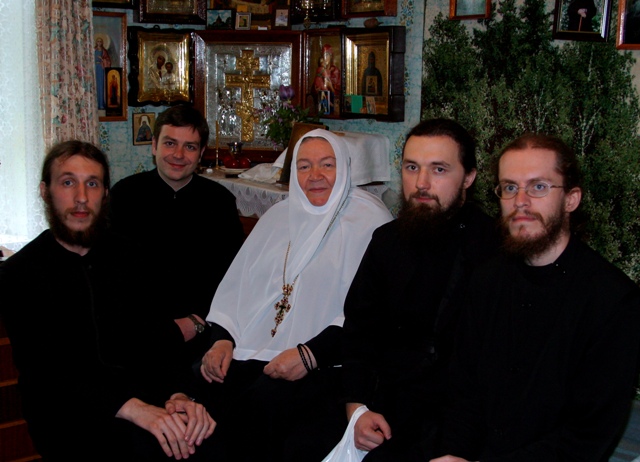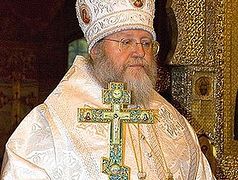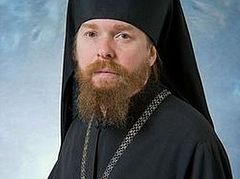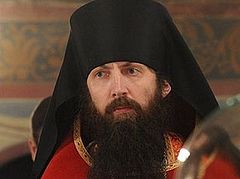 Monk Nicholas (Muromtsev)
Monk Nicholas (Muromtsev)
I was baptized without really knowing what I was doing. It happened through the “initiative” of my friend Dmitry Dementiev, who now works in the office of Sretensky Theological Seminary. On 5 September 1993, we visited him on his birthday, and his mother decided to give Dima and his younger sister a gift—to have them baptized. All of us, including his friends, went to the church. Before the baptism, Dmitry walked around the church, looked at everything, said that he didn’t understand anything there, and that for the time being, he wasn’t going to get baptized. It was decided that one of us should get baptized. I was supposed to leave for the army in six weeks, so they decided to baptize me. We didn’t know anything about the fundamentals or concepts of the faith, and I soon forgot that I had been baptized. The first time I consciously thought about God was when I was serving in the army, in the FSB [Federal Internal Security Bureau] in Moscow (1993-1995, during the first war in Chechnya). Two days before graduation from sergeant’s school, the opening of military operations in Chechnya was announced. When all of us in our unit were standing in formation, it was proposed that anyone who was prepared to go to Chechnya, should take a step forward. All of us stepped forward, bound together by a united, heartfelt feeling of sincere patriotism. That night I began to think about the decision I had made. I remembered the military actions in Afghanistan, from which our boys returned wounded, contused, or didn’t return at all….Then I prayed for the first time. I asked God that the decision I had made, not have fatal consequences for me and my relatives. After all, mama herself had given her approval for me to join up, and I didn’t want her to blame herself afterwards. I made a vow: if I return safely from the army, I will live the life of an Orthodox Christian.
Four times we were supposed to leave for Chechnya, but every time something came up that prevented it. Finally I was discharged and transferred to the reserves. Our whole garrison was disbanded several days later, and all of the other 2000 men were sent to Chechnya. Then I understood what had protected me from being sent to Chechnya; and arriving home in Petrozavodsk, I went around to all the churches. I didn’t have the slightest idea about what church-life or the sacraments were. The way I understood it, to lead a Christian life meant to go into a church, light a candle, stand there for a few minutes, and leave.
After a month and a half, I got a job with the police department and forgot about everything spiritual. Only three years later, when I was already living in the monastery, did I remember that night when I was in the army and the vow I had made to God.
Tell us how you how you came to enter the monastery.
I was sent to school for further training as a policeman, and after finishing it, returned to my department. Soon we decided to celebrate my graduation and drove outside town to buy shish kebab. On the way, the driver lost control and the car flipped over. The accident happened early in the morning, and I at that time was sleeping in the forward passenger seat and didn’t see anything. When I came to, I found that I couldn’t move, and certainly couldn’t get out of the car by myself. Only towards noon did an ambulance come. They took me to a hospital. The doctors diagnosed dislocation of the fifth cervical vertebra and a severely pinched spinal cord. They wanted to operate, but the chances of success were only 4%; and furthermore, they didn’t have the necessary drugs and medicine. My chiefs at the police department managed to get the medicine, and the operation took place. I was in intensive care for three days. When they took me back to the ward, I was still completely paralyzed and had feeling only in my face. When my family asked about my prospects, the doctors answered that miracles don’t happen and that I would remain in that condition for the rest of my life; that doctors could get me on my feet only through very expensive treatment in Japan or China.
My recovery began considerably later. I was helped by a device invented by a professor who lived in our area, in Karelia. After dozens of procedures, I began to recover; and after a year, I could hold a spoon myself. But at that time, I did not realize that the Lord was helping me, and attributed it all to happenstance. For me, the main goal was my recuperation; and for that I used every possible means and resource. One of these resources was the false teaching of Porfiry Ivanov. One of the other patients had given me a brochure of his to read when I was in the hospital. Since his teaching on first sight seems to improve your health, I decided to try it. Later, when I came to the monastery, they explained to me that the teaching of Ivanov is false.
I came to the monastery through my friend whom I mentioned before, Dmitry Dementiev; he was already living in the monastery at that time. On one of his leaves home, he told me about the monastery and suggested that I go and check it out for myself. Father Anastassy Popov (+2005), who was also on leave in Petrozavodsk at that time, drove me to the monastery. I worked for a month at the administration building’s entrance desk near the father-abbot’s office. I liked life in the monastery, and now I’ve already been here eleven years.
What do you remember about Father Anastassy?
A lot of things tied Father Anastassy and me together. He also was born in Petrozavodsk, and so we sometimes traveled home together on leave. He knew my parents well. When my mother would come to the monastery, she would confess only to Father Anastassy. Perhaps for that reason he felt responsible for me and protected me. When there was discord between the brothers, he would silently come up to me, turn me around, and literally push me to another area so that I wouldn’t see anything. I am very glad that the Lord brought me to a monastery where there was a person like him when I was taking my first steps on the path of Christian life.
How did you family and friends take your departure for a monastery?
Different friends took it in different ways. Some of them didn’t believe it; knowing my past, my cheerfulness and love of life, they couldn’t imagine it. In their understanding, living in a monastery didn’t bear any resemblance to my approach to life. Other friends took it calmly, understanding that I was searching for something in life and that this, perhaps, was my path. Now my friends have respect for my choice, and many of them ask me questions about the faith. The fact that Dmitry and I finished seminary and have a theological education also has a strong influence on them.
As for my parents, my father took it very calmly. My mama couldn’t accept it at first. After a year she came to visit me, and while we were walking from the train station to the monastery, she spoke only of how I should return home and get married, and in general, that she wanted to be a grandmother and have grandchildren to fuss over. It would have been useless to argue with her at that moment, so I just kept walking and listened silently. When we were here in the monastery and she saw where I live and work, and had the chance to talk to people here, she told me, “You know, Valera (before monasticism, my name was Valery), you can stay here as long as you need to.” When I asked how she came to that decision, she answered, “All the young men here actually radiate love, and between you are the kind of relationships which I have always wanted to create in our family. We’ve achieved it in our family to a certain extent, but the ideal I’ve seen only here with you all. Such conditions I could never create at home, so yes, do live here; but for the time being, please don’t take monastic vows.” My younger sister, when she learned that I was going to stay at the monastery, told our mama, “Leave him in peace; instead of him, I’ll give you grandkids,” which in fact she did: now she has three children—two girls and a boy. Seven years later when the head of the monastery, Father Tikhon, suggested that I take monastic vows, my mama was already completely at peace with the thought that the rest of my life would be bound up with the monastery and therefore calmly received the news of my up-coming monastic vows.
Tell us about your monastic tonsure.
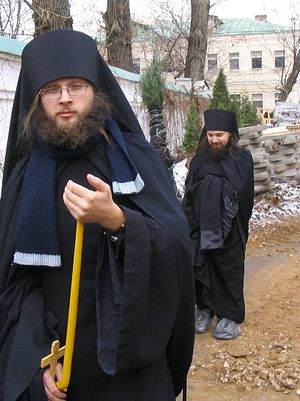 After taking monastic vows. Monk Nicholas in the background; Monk (now Hierodeacon) Seraphim in the foreground
After taking monastic vows. Monk Nicholas in the background; Monk (now Hierodeacon) Seraphim in the foreground As we were leaving the church, it made a very strong impression on me when I heard a question, “Who’s that coming toward us?” and the answer: “Angels!” At that moment I realized how people perceive us, and I understood what kind of responsibility lay upon me.
Subsequently you studied at Sretensky Seminary. What do you remember about that time?
Life in the monastery was a little different than now. There weren’t that many seminarians, and almost all the brothers were also studying there. We lived a single, common life; all sorrows and joys were shared by all of us; we did our obediences [assigned tasks] together—it was joyous and lively. I vividly remember endless print runs [book-printings] from our publishing department, when for all seminarians, classes were cancelled and sometimes even exams, in order to load and unload books. The storehouses were far away, and the students would leave at 3 o’clock, immediately after lectures, and return at 11 or 12 at night. In the monastery something was always being built, changed or redone. They took up the asphalt which was on the ground outside and laid flagstones. All this work was going on day and night, so that we slept to the sound of excavating machines and jackhammers.
Studying was more complicated then than now because at first it was simply a specialized theological high school; in the fourth and fifth years, when it was changed to a seminary, we also had to learn subjects from earlier seminary-years. And so there were a lot more exams, and studying was thus more difficult; but we helped each other prepare for the exams and lectures. Six or seven of us would gather in someone’s cell [monastic room]; one would read and the others listen. This warm setting was a small reflection of the spiritual unity which exists in church between the worshippers when they are all praying together.
Father Nicholas, what obediences [monastic chores] have you had during your time at Sretensky Monastery?
When I first got to the monastery, I was immediately given an obedience at the administration building’s entrance-desk near the father-abbot‘s office; there were also other small obediences. The future Father Cleopa and I painted the monastery walls, and he told me lives of saints.
I clearly remember how we collected humanitarian aid for Chechnya. I would rise at 6 am and organize the work sites for the people who would be collecting the donations; and until they arrived, I myself would do the collecting. The work consisted not only of receiving the donations but also of recording the names of the donors for future remembrance [in prayer] at the monastery. I took this work on as essential for my spiritual growth, and fulfilled it with special enthusiasm.
I also worked in the monastery’s publishing department. And in the library, when at first the person in charge was Father Arseny, and then Father Adrian. During this time, its basic stock of books was collected. Now the library has books not only from our publishing department, but also all the other different books that the students need for their seminary education. These other books were bought at the request of the instructors. Sometimes we had to buy very expensive books in single copies, only for reading in the reading hall. Also during this period, the seminary began long-distance teaching, with its base at our library: lectures were given in the library, the instructor was filmed by three cameras, and his lecture was broadcast live by satellite to other seminaries. Since this broadcast was live, at the end of it, the listening students could ask questions and hear the answers.
When the seminary grew larger, the positions of pro-rector [provost] and on-duty assistants were introduced for help with education and character-formation: seven of the brothers were given this job as assistants, one for each day of the week; I was one of them. I still carry out this obedience, and am also an assistant to the “blagochiny”* [*hieromonk in the monastery overseeing good order and behavior, discipline, fulfillment of obediences, etc].
What rules should a person follow in working with seminarians?
There’s no single, unequivocal answer to that question. Every person is unique, and each one requires a special approach. One person you can talk to in an informal way, and he appreciates it and responds well; and another might not understand it and try to turn it into a too-friendly, buddy-buddy relation. It’s important to relate well to everyone, at the same time preserving the necessary and proper distance.
Did you ever have the wish to beg off from a particular obedience?
Such a thought hasn’t arisen, since this isn’t my first year in the monastery, and I take on each obedience as necessary and indispensable for the monastery; and if they have entrusted it to me, then I ought to do it to the best of my ability.
Father Nicholas, what positive and negative moments are there in the obedience of on-duty assistant to the pro-rector?
There are probably pluses in the fact that at (for example) Holy Trinity-Saint Sergius Lavra*, all the on-duty assistants are priests or deacons, and all have a great deal of experience in dealing with people, which is very important in such complex work. [*lavra: a large monastery]
I see a positive side to the obedience of on-duty assistant in that we get to see how a young man changes during his period of study in the seminary, how he becomes worthy to serve in the holy altar as priest or deacon. I see such changes in these young men as partly due to the care and labor of the on-duty assistants.
What interesting occurrences do you remember in the life of the seminary?
I remember the first soccer game between Sretensky Monastery and the Institute of [Frontier] Border Guards. When we went to their institute, they looked at us with a silent question in their eyes: what are these people doing here in podriasniks [long monastic robes]? But then our players changed into athletic uniforms and we entered the stadium. In that stadium, by the way, there were not only sporting events but also training in hand-to-hand combat and in knife-throwing (As they later told us, these young men were preparing for tours of duty at “hot spots”). It was a real shock for the border guards when, a minute and a half into the game, we kicked the ball into their net. And for the first time resounded the victory cry of Sretensky Seminary’s team, and up into the sky was raised the flag of the Life-Giving Cross with green branches sprouting from its base, the symbol of our monastery. And a couple minutes later, we again hammered the ball into their net! With that, we attracted the attention of the whole stadium. The border-guards immediately put in different players; they understood that they had under-estimated us and needed to put in better players. But after a while, the ball had flown into their net several more times. At the end of the first period, the score was 6-0; and you could read in the eyes of the border-guards the question, “Can it be that we didn’t score even once?”Starting the next period, they again changed players and managed to score one goal. But even so, the final score was 10-3. After the game they cordially invited us to the dining area and we all had some good food and agreed to carry out friendly competition in the future. Now these young men are already officers in various branches of the military; they come with their families to the monastery for major feasts like Pascha [Easter] and the Nativity of Christ, and help support the monastery. Many of them, when they are getting ready to report to a “hot spot”, come and ask for prayers, go to confession, receive Holy Communion, ask for a blessing, and then leave for their dangerous assignment with peace of soul.
What qualities can seminary nurture in a seminarian?
In my opinion, seminary ought to give a seminarian, as a future pastor and “shepherd”, experience and training in inner discipline and self-control. Also, a young man matures as a human being and learns about church services and serving in the Church, about fellowship, about how to talk to people and get along with them. He receives not only a stock of theoretical knowledge given by instructors in the lectures but specifically practical experience received through various obediences during the church services, in church, sweeping the grounds outside.…
Father Nicholas, what would you wish for the students?
I wish them not to forget those years they have spent within the walls of Sretensky Seminary, because it was here that they found their friends and acquired the unforgettable experience of communicating with the Seminary instructors and also with the brothers of Sretensky Monastery.

